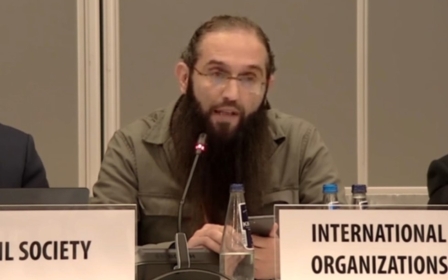UK counterterrorism police raid home of Electronic Intifada journalist Asa Winstanley

Counterterrorism police have raided the London home of a prominent journalist covering the occupation of Palestine and Israeli influence in the UK.
The Electronic Intifada website said that about 10 police officers arrived at the home of its associate editor, Asa Winstanley, shortly before 6am on Thursday.
Winstanley was not arrested and has not been charged with any offence, but police confiscated his electronic devices, the website said.
Citing a letter addressed to Winstanley from “Counter Terror Command”, the website said he had been told he was being investigated for offences under the Terrorism Act connected to his social media posts. It said police were "aware of [Winstanley's] profession" as a journalist.
The letter cited “possible offences” under sections 1 and 2 of the Terrorism Act, relating to the offence of “encouragement of terrorism”. It said the raid had been conducted as part of an operation codenamed “Operation Incessantness”.
New MEE newsletter: Jerusalem Dispatch
Sign up to get the latest insights and analysis on Israel-Palestine, alongside Turkey Unpacked and other MEE newsletters
The Metropolitan Police told Middle East Eye that counterterrorism officers had searched an address in Wembley, north London, and seized electronic devices as part of an investigation into suspected terrorism offences of "support for a proscribed organisation" and "dissemination of terrorist documents".
Writing on the social media platform X, Electronic Intifada director Ali Abunimah said: "Regretfully as part of the UK's intensifying crackdown on free speech about Palestine, British 'counterterrorism' police have raided the home and seized devices of our @intifada colleague @AsaWinstanley. Asa can count on our full support and solidarity."
The Electronic Intifada is a US-based website founded in 2001 which describes itself as “an independent online news publication focusing on Palestine”.
Winstanley has written for the Electronic Intifada since 2009 and has been an associate editor since 2012. He comments regularly on social media on issues relating to Palestine and Israel, including the ongoing war between Israel and Hamas in Gaza, and has more than 117,000 followers on X, the social media platform formerly known as Twitter.
Winstanley contributed a number of articles to Middle East Eye between 2015 and 2018.
He is the author of a recent book, Weaponising Anti-Semitism, which accused the pro-Israel lobby in the UK of orchestrating a campaign to undermine the former Labour leader Jeremy Corbyn.
In recent months, Winstanley has reported on arrests and raids by counter-terrorism police targeting other journalists and pro-Palestine activists.
Last month, the general secretaries of the UK’s National Union of Journalists and the International Federation of Journalists wrote to Metropolitan Police Assistance Commissioner Matt Jukes, the head of Counter Terrorism Policing in the UK, to raise concerns about the use of counter-terrorism powers against journalists.
The letter came after a freelance journalist Richard Medhurst was detained and questioned by police at Heathrow Airport. Medhurst said he believed he was targeted for speaking out on the situation in Palestine.
Commenting on that case, Michelle Stanistreet, NUJ general secretary, and Anthony Bellanger, IFJ general secretary, said that the use of counter-terrorism powers against journalists would have a “chilling effect” on journalists in the UK.
“Journalism is not a crime. Powers contained in anti-terror legislation must be deployed proportionately – not wielded against journalists in ways that inevitably stifle press freedom,” they said.
A Metropolitan Police spokesperson said: "We can confirm that officers from the Met’s Counter Terrorism Command executed a search warrant at an address in Wembley on 17 October. This was carried out as part of an ongoing investigation into suspected terrorism offences contrary to section 12 of the Terrorism Act (TACT), 2000 (support of a proscribed organisation) and sections 1 and 2, TACT 2006 (dissemination of terrorist documents).
"No arrests were made and officers seized various electronic devices from the address under section 50 of the Criminal Justice and Police Act, 2001. Enquiries continue."
Middle East Eye delivers independent and unrivalled coverage and analysis of the Middle East, North Africa and beyond. To learn more about republishing this content and the associated fees, please fill out this form. More about MEE can be found here.




